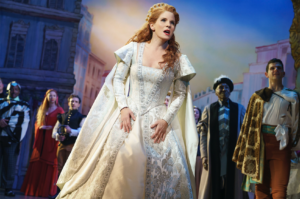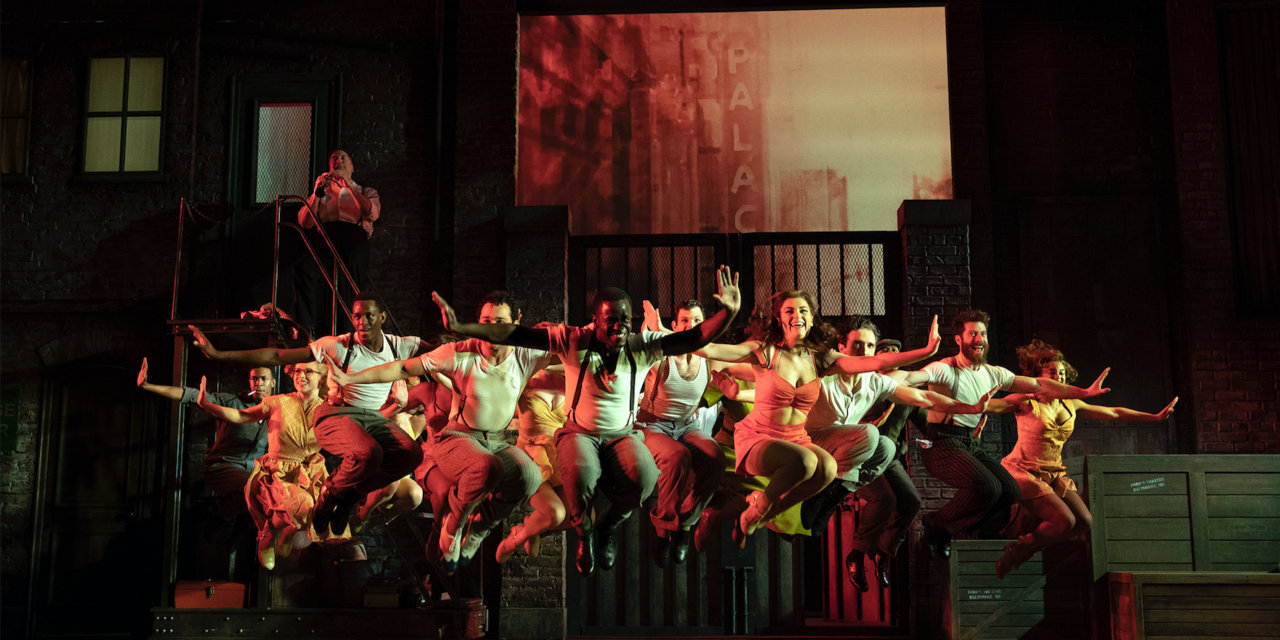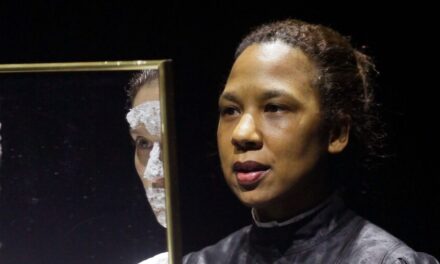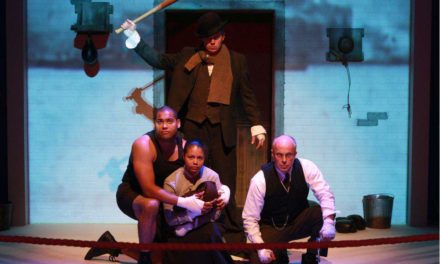Anyone who tells you that Cole Porter’s Kiss Me, Kate isn’t, or can’t be, a kick in the teeth to what The Taming Of The Shrew says about women or to what the Golden Aged American musical could or couldn’t mock hasn’t given this classic enough thought.
Both a musical adaptation of The Taming Of The Shrew and a musical about a company of actors in Baltimore opening this failed adaptation, all entangled in a brawl between Fred Graham (Will Chase) and Lilli Vanessi (Kelli O’Hara), a divorced husband-and-wife team reuniting to play Katherine and Petruchio, Kiss Me, Kate is itself caught up in concentric, rebellious narratives of what it’s like to be tamed.
Constructing a musical that flits between the sardonic and satiric worlds of Fred and Lilli, Katherine and Petruchio with an anachronistic flair for the sensical division of either (Ethan Mordden once asked in regard to “Brush Up Your Shakespeare:” “Now, wait a minute: are these two buffoons actually singing a number onstage during a performance of the Shrew musical with orchestral accompaniment? Who wrote the song? When did they learn it? When was it orchestrated?), Kiss Me, Kate was Cole Porter’s defiant response after Oklahoma! re-shaped the musical’s structure, song and story now stubbornly forced to work together in the service of a logical, integrated narrative.
Though Lilli is modeled after Shakespeare’s Katherine, it’s hard to seriously argue that Porter makes a sincere effort to tame either. When Katherine (or Lilli) sings I Am Ashamed That Women Are So Simple, though taken from eleven lines of an appallingly misogynistic Shakespearean monologue, her song is placed within a musical that has so obviously subverted the sanctity of Shakespeare (not including Porter’s hubris in setting Shakespeare’s “lyrics” to his own music). Porter’s complete destruction of The Taming Of The Shrew with Fred and Lilli’s on-stage shenanigans, paired with Fred’s petulance next to Lilli’s rebellious grace, destroys any sense of Petruchio’s dominance. Bianca, played by Lois Lane (Stephanie Styles), has already sung “Tom, Dick or Harry,” stooping this Shakespearean effort to low sexual humor (“a dick-adick” is the refrain) and affirmed her own libidinal freedom with Always True To You In My Fashion. That Katherine—Lilli having previously abandoned the show in utter frustration toward Fred, then returned—shows up to sing these lyrics is more ironic than sincere.
In other words, Kiss Me, Kate (which won the first ever Tony for Best Musical) was and continues to be an unruly, musical f-you to convention and constraint during a time when other creators were seriously at work in injecting some art and grace into the vacuous entertainment of musical variety theatre. One might think such a rebellious streak could tee-up the classic for a glorious 2019 revival, and it’s a darn shame that Roundabout Theatre hasn’t lived up to this expectation, their revival of Kiss Me, Kate now open at the Studio 54 Theater.
Do come if you’d like to see Kelli O’Hara crack a whip and sing the roof of Studio 54. It’s well worth the trip to bask in her glorious soprano, her Lilli one for the ages (reprising the role from her turn in Roundabout’s 2016 concert version). Her onstage chemistry with Will Chase, who plays a rather generic, unspecific Fred, is impeccable, the two a hilarious and natural match for the dueling exes. O’Hara’s I Hate Men, not the grievance of an irritable and caviling girl, but the earned and jaded objections of a woman who knows best (and the voice of our collective exhaustion), is a well-anticipated and rewarding number.
And the women do rule this production. As Lois Lane, Stephanie Styles is a sheer delight. Her Always True To You In My Fashion, dripping with just a nasty Broadway pizzazz that makes the fan in me smile like a giddy idiot, is a show-stopping number, gleaming with the captivating and calculated precision of a woman who knows (and gets) what she wants. Her Lois Lane walks circles around every man on the stage (including her gambling lover, Bill Calhoun, played by Corbin Bleu), not the other way around—and that’s the way it should be.
Yet, O’Hara and Styles are singular comforts in a revival that feels lackluster, missing a certain, dazzling spark.

Kelli O’Hara in Kiss Me, Kate. Courtesy of Joan Marcus.
To be clear, the revival’s misstep is not that it has ignored Kiss Me, Kate’s gender imbalances. Despite Porter’s rebelliousness in confronting The Taming Of The Shrew, a modern Kiss Me, Kate must do some necessary leveling between Fred and Lilli, and Roundabout’s production certainly does do that. Amanda Green was brought in by director Scott Ellis to make delicate adjustments to the script and lyrics, and she’s succeeded with a light touch. The most noticeable revision has been the replacement of “women” with “people” in Katherine’s final song, now I Am Ashamed That People Are So Simple and a more general plea for human kindness. However, because Green’s adjustments are so subtle—if you didn’t know Kiss Me, Kate inside and out you’d probably never catch the changes—the gesture seems more like an effort to correct the record than to noticeably amend audiences’ experiences.
Whatever is awry with this revival is far more subtle. It’s just a fairly straight reproduction, exciting in very few of its restorations. Revivals of classic musicals offer tough competition these days. Last season, Lincoln Center’s My Fair Lady gave a masterclass in the resurrection of the Golden Age musical, and while Jack O’Brien’s attempt at Carousel was less successful, it was equally extravagant. This season, director Daniel Fish is bringing an utterly reimagined and re-orchestrated Oklahoma! to Broadway, and I’m not sure Roundabout’s familiar production, which doesn’t seem to improve much on Kiss Me, Kate’s last, 1999 revival, makes the cut as something deliciously worthwhile.
Some technical issues stem from the production’s staging and design, which seems a bit overgrown for Studio 54’s relatively snug stage. David Rockwell has designed indulgently classic sets for this revival—his multi-floored, backstage piece is gorgeous—but they seem to swallow up the limited space the stage offers. This becomes a problem in lavish dance numbers like Too Darn Hot (bravo to Greg Thymius on the clarinet) which, while demandingly choreographed by Warren Carlyle, feels like it’s about to spill off the proscenium, and not in a good way.
The leading men also underwhelm, and I fear that a parcel of Katherine and Lois’ strength in this production may, unfortunately, derive from the relative weakness of the male characterizations around them. Though Will Chase has a commanding singing voice, he plays a much broader Fred than O’Hara’s specifically intelligent, spunky and deliberate Lilli, and while that difference may account for a refreshing dynamic between the two characters (no longer does Fred bend Lilli over his knee and spank her; Lilli does as much kicking and punching, perhaps more, than he does), it doesn’t strike me as entirely purposeful. Corbin Bleu (whose tapping could use more rehearsal; not that he hasn’t taken Carlyle’s challenging choreography in stride, but I can see him thinking) seems similarly lost in Billy Calhoun, playing Corbin Bleu in Kiss Me, Kate more than a fully realized character. What results from both is a lopsided production that lacks a certain finish and fullness.
I heard another musical opening on Broadway this season (hello, Be More Chill) make the valid accusation that there are no good leading roles for girls in high school theater, and no one can deny that Roundabout’s (and Kelli O’Hara’s) Kiss, Me Kate installs Lilli Vanessi as ever the role model, their efforts enough to excavate and remake a piece of what Cole Porter defiantly saw in Shakespeare’s Shrew.
But, and perhaps unforgivingly, Roundabout’s revival fails Kiss Me, Kate’s original (and oft forgotten) mission. Porter crafted this now classic musical as a formal notice of resistance, a tongue-in-cheek commentary on standard and convention. What could be more readymade for an innovative reimagining—and what might another good and decent revival, wasted potential, do for a musical otherwise screaming for an inventive touch?
This post was written by the author in their personal capacity.The opinions expressed in this article are the author’s own and do not reflect the view of The Theatre Times, their staff or collaborators.
This post was written by Michael Appler.
The views expressed here belong to the author and do not necessarily reflect our views and opinions.


















